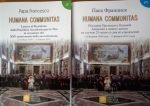Abp. Paglia in Moscow talks about end of life and Palliative Care

Moscow, 12 February 2019. - “A globalization devoid of Christian inspiration is poor in love and prey to conflicts; and the task of the Christian world is to re-center relations between people: Care means taking care of others, as the Gospel teaches. The parable of the Good Samaritan takes on a new dimension in the technological and hyper connected society whose implications are people "increasingly withdrawn into their own enclosures," reiterated Abp. Vincenzo Paglia, President of the Pontifical Academy for Life.
Abp. Paglia was speaking in Moscow on Tuesday 12 February, at the International Conference "Death and dying in a technological society: between biomedicine and spirituality" on the occasion of the third anniversary of the meeting of the Patriarch of Moscow and of the whole Russia Kirill and Pope Francis in Havana (12 February 2016). The meeting on the theme of the end of life is turning to the theological Institute Saints Cyril and Methodius and to suggest the theme of euthanasia was the Pontifical Academy for Life, in particular Archbishop Vincenzo Paglia, as "privileged platform - said Cardinal Koch - of the relations between our Churches in the academic field ".
Addressing the theme "At the service of human dignity, called to life" in light of Humana Communitas, the Holy Father’s Letter to the Pontifical Academy for Life, Abp. Paglia stressed that in "taking care", "we must take care of human life in the sense of the human quality of the choices that guard and reaffirm the ultimate destiny of life" while at the same time caring for the environment. "We are called to rediscover tour connection to and relationship with the places that host our lives".
After having framed the challenges posed by the specific theme of the "end of life", Abp. Paglia focused on how the Pontifical Academy has inserted as one of the qualifying points of its commitment as Palliative Care.
Palliative Care accompanies people in the transition to death. It does not abandon the sick person, as is sometimes the case when it is deemed that there “is nothing left to do neither is it directed towards a "therapeutic obstinacy".
Palliative Care teaches us that "we have no patients; we have people, with all their physical, psychological, cultural and spiritual baggage". It recognizes "the presence of family members and of those who work for their health" alongside the sick.
Palliative Care "re-locates the suffering person, even those preparing for the passage of death, within his or her fundamental, familial and social relational dynamic. You cannot die alone! Experience has shown that the demand for euthanasia or assisted suicide is in almost all cases the result of the social and therapeutic abandonment of the patient. On the contrary, once a valid multidisciplinary acceptance of the patient has been put in place and the network of affective and professional relationships is positively involved, it is very rare to find a request for death ".
"Dear friends - concluded Msgr. Paglia – our discipleship of the Lord Jesus, healer of bodies and souls, entrusts us with responsibility for the lives of men and women, especially the youngest and poorest, of today and of future generations. It is a great challenge, due to the complexity of the world in which we live and the vastness of its horizon. Of course it cannot be reduced to a simple technological question. In this age of ours, Christianity can truly help the whole of humanity to grasp the challenges of life in an essential and elemental humanistic and spiritual dimension ".
Finally, Msgr. Paglia gifted the Moscow Patriarchate and the local Catholic Church a Russian translation of the Letter Humana Communitas.
Moscow, 12 February 2019



